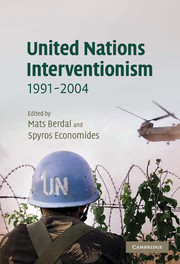1 - Introduction
Published online by Cambridge University Press: 22 September 2009
Summary
The nations and peoples of the United Nations are fortunate in a way that those of the League of Nations were not. We have been given a second chance to create the world of our Charter that they were denied. With the cold war ended we have drawn back from the brink of a confrontation that threatened the world, and, too often, paralysed our organisation.
Boutros Boutros-Ghali (1992)Historians may look back on the first years of the twenty-first century as a decisive moment in human history. The different societies that make up the human family are today inter-connected as never before. They face threats that no nation can hope to master by acting alone – and opportunities that can be much more hopefully exploited if all nations work together.
Kofi A. Annan (2004)The first edition of this book attempted to assess the chances that an international society would be able to respond positively to the second chance identified by Boutros Boutros-Ghali, the then United Nations (UN) secretary-general. It did so by examining three major international interventions of the early post-Cold War period in Cambodia, former Yugoslavia and Somalia. Well before the book went to press, it was already clear that the answer was not a foregone conclusion. Partly in reaction to failures on the ground and partly due to the escalating demands for UN intervention around the world, optimism gave way to pessimism as the prevailing mood surrounding UN peacekeeping.
- Type
- Chapter
- Information
- United Nations Interventionism, 1991–2004 , pp. 1 - 31Publisher: Cambridge University PressPrint publication year: 2007
- 1
- Cited by

